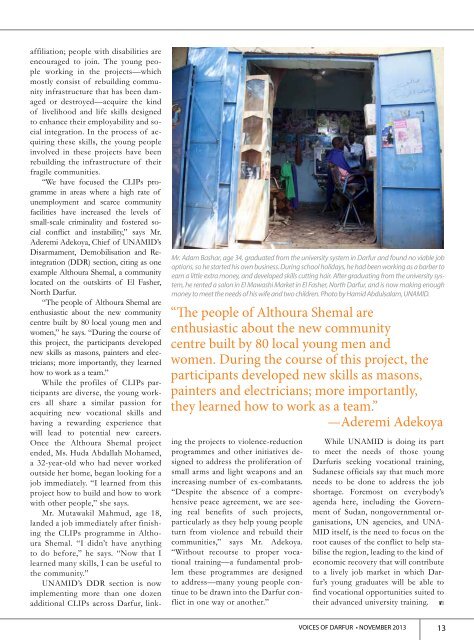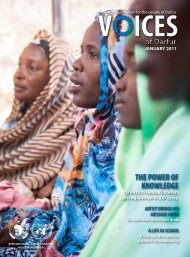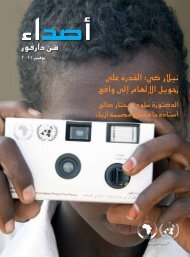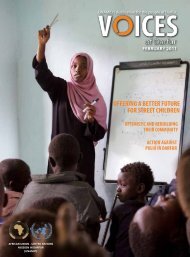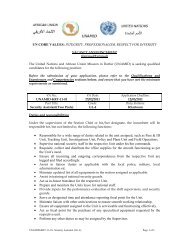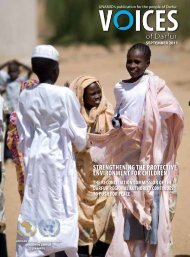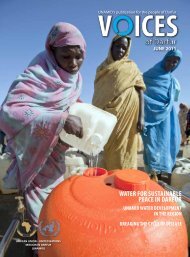Darfur Dances
Download the magazine (PDF) here. - Unamid
Download the magazine (PDF) here. - Unamid
- No tags were found...
Create successful ePaper yourself
Turn your PDF publications into a flip-book with our unique Google optimized e-Paper software.
Mr. Adam Bashar, age 34, graduated from the university system in <strong>Darfur</strong> and found no viable job<br />
options, so he started his own business. During school holidays, he had been working as a barber to<br />
earn a little extra money, and developed skills cutting hair. After graduating from the university system,<br />
he rented a salon in El Mawashi Market in El Fasher, North <strong>Darfur</strong>, and is now making enough<br />
money to meet the needs of his wife and two children. Photo by Hamid Abdulsalam, UNAMID.<br />
“The people of Althoura Shemal are<br />
enthusiastic about the new community<br />
centre built by 80 local young men and<br />
women. During the course of this project, the<br />
participants developed new skills as masons,<br />
painters and electricians; more importantly,<br />
they learned how to work as a team.”<br />
—Aderemi Adekoya<br />
affiliation; people with disabilities are<br />
encouraged to join. The young people<br />
working in the projects—which<br />
mostly consist of rebuilding community<br />
infrastructure that has been damaged<br />
or destroyed—acquire the kind<br />
of livelihood and life skills designed<br />
to enhance their employability and social<br />
integration. In the process of acquiring<br />
these skills, the young people<br />
involved in these projects have been<br />
rebuilding the infrastructure of their<br />
fragile communities.<br />
“We have focused the CLIPs programme<br />
in areas where a high rate of<br />
unemployment and scarce community<br />
facilities have increased the levels of<br />
small-scale criminality and fostered social<br />
conflict and instability,” says Mr.<br />
Aderemi Adekoya, Chief of UNAMID’s<br />
Disarmament, Demobilisation and Reintegration<br />
(DDR) section, citing as one<br />
example Althoura Shemal, a community<br />
located on the outskirts of El Fasher,<br />
North <strong>Darfur</strong>.<br />
“The people of Althoura Shemal are<br />
enthusiastic about the new community<br />
centre built by 80 local young men and<br />
women,” he says. “During the course of<br />
this project, the participants developed<br />
new skills as masons, painters and electricians;<br />
more importantly, they learned<br />
how to work as a team.”<br />
While the profiles of CLIPs participants<br />
are diverse, the young workers<br />
all share a similar passion for<br />
acquiring new vocational skills and<br />
having a rewarding experience that<br />
will lead to potential new careers.<br />
Once the Althoura Shemal project<br />
ended, Ms. Huda Abdallah Mohamed,<br />
a 32-year-old who had never worked<br />
outside her home, began looking for a<br />
job immediately. “I learned from this<br />
project how to build and how to work<br />
with other people,” she says.<br />
Mr. Mutawakil Mahmud, age 18,<br />
landed a job immediately after finishing<br />
the CLIPs programme in Althoura<br />
Shemal. “I didn’t have anything<br />
to do before,” he says. “Now that I<br />
learned many skills, I can be useful to<br />
the community.”<br />
UNAMID’s DDR section is now<br />
implementing more than one dozen<br />
additional CLIPs across <strong>Darfur</strong>, linking<br />
the projects to violence-reduction<br />
programmes and other initiatives designed<br />
to address the proliferation of<br />
small arms and light weapons and an<br />
increasing number of ex-combatants.<br />
“Despite the absence of a comprehensive<br />
peace agreement, we are seeing<br />
real benefits of such projects,<br />
particularly as they help young people<br />
turn from violence and rebuild their<br />
communities,” says Mr. Adekoya.<br />
“Without recourse to proper vocational<br />
training—a fundamental problem<br />
these programmes are designed<br />
to address—many young people continue<br />
to be drawn into the <strong>Darfur</strong> conflict<br />
in one way or another.”<br />
While UNAMID is doing its part<br />
to meet the needs of those young<br />
<strong>Darfur</strong>is seeking vocational training,<br />
Sudanese officials say that much more<br />
needs to be done to address the job<br />
shortage. Foremost on everybody’s<br />
agenda here, including the Government<br />
of Sudan, nongovernmental organisations,<br />
UN agencies, and UNA-<br />
MID itself, is the need to focus on the<br />
root causes of the conflict to help stabilise<br />
the region, leading to the kind of<br />
economic recovery that will contribute<br />
to a lively job market in which <strong>Darfur</strong>’s<br />
young graduates will be able to<br />
find vocational opportunities suited to<br />
their advanced university training. V<br />
VOICES OF DARFUR • NOVEMBER 2013<br />
13


